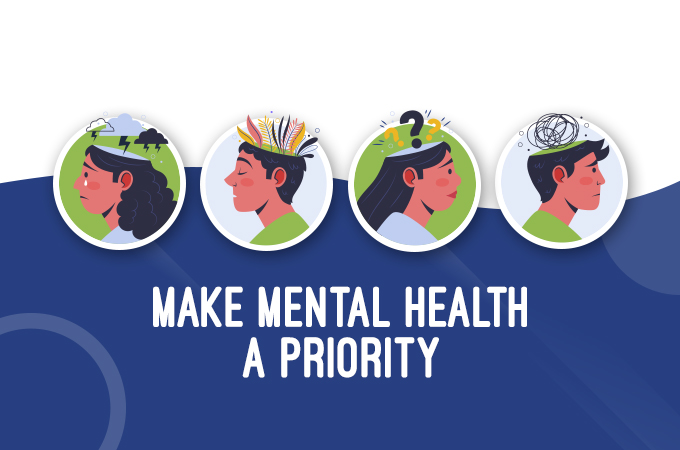Providing adequate mental health support at the workplace is no longer a “nice-to-have” addition but a necessity. While a lot has changed post the pandemic, mental health issues are the focal point of discussion in businesses of all sizes. The awareness around mental health over the recent years and its effect on employees and productivity have propelled organizations to take steps to prioritize the mental health of workers.
According to Gallup’s State of the Global Workplace: 2021 Report, 57% of U.S. workers reported feeling daily stress, up by eight percentage points from the prior year.
Modern companies should give a thorough check of their existing policies and create mental health programmes to support employees. Creating wellness programs helps employees thrive and improve their mental health. Work-related stress can compound and create a negative effect on your work while also harming your overall health.
Mental health in conjunction with physical health and social well-being is a crucial component of overall health. In today’s age, businesses must make employee mental health a top priority to hire and retain high-performing employees.
Why should companies prioritize mental health?
Poor mental health can affect how employees perform, resulting in poor employee morale and emotional distress. It can result in:
- Poor job performance
- Disengaged employees
- Low productivity
- Low employee morale
- Poor focus at work
- Performance issues
- Safety liabilities
- High turnover
- Compromised decision-making skills
44% of employers added or increased wellness programs. – PwC’s 2021 Health and Well-being Touchstone Survey
The days of not acknowledging mental health or not talking about the issues are long gone. Having good mental health allows us to recognize, express, and regulate our emotions. At work, it helps in dealing with the changing environment and responsibilities. It makes it easier to deal with challenges, flourish in your respective role, manage stress and boost resilience.
Several work-related factors impact mental health:
- Poor communication and faulty management practices
- Inadequate health and safety practices
- Stressful work environment
- Poor work-life balance
- Performance pressure
How to promote mental health in the workplace?
Taking proactive steps at the workplace can help improve and maintain the mental health of employees at the workplace. As an employer, it is imperative to take steps that promote the mental well-being of employees at work. Offer resources to employees grappling with mental health issues and make services accessible and easy to approach. However, a majority of workers do not need clinical care and require mental health support.
- Employee Assistance Program
An Employee Assistance Program (EAP) is designed to assist employees struggling with personal or work-related issues that are affecting their work or overall well-being. These programs involve coverage for a fixed number of counselling sessions along with extending other support to improve mental health. Employees can generally access these services online, via email, or through face-to-face conversations.
- Examining organizational practices
The poor work-life balance in organizations is also a major cause of anxiety and can negatively impact mental health. As an organization, you should relook at your existing practices and address issues that are bothering employees. This can be work hours, over time, the behaviour of staff and senior management, the general treatment of employees etc. Addressing workplace policies and creating an empathetic environment goes a long way in supporting employee well-being.
- Provide mental health self-assessment tools
While self-assessment tools don’t provide a concrete diagnosis of issues, they can act as the starting point to recognize problems and address them adequately. Some of these tools may include a mood assessment checklist, work-life balance assessment quiz, mental health recognition quiz, online mental health checkup with professionals, etc. These resources can be beneficial to the employee in recognizing the initial signs of mental illness.
- Improved access to mental health care
Health care plans of businesses often overlook the impact of mental health on the overall well-being of employees. Introduce provisions for mental health checkups and provide adequate medical help wherever necessary. Quick and easy access to mental health care will make it easier for employees to receive timely help and support. This allows people to get help proactively rather than reactively.
- Allocate mental wellness days
Many employees hesitate to take a break fearing rebuke from the company or due to the lack of allocated leaves. This results in disengagement and poor productivity levels in the organization. To avoid this scenario, organizations are offering paid or unpaid mental health leaves. For this to be utilized optimally, employees must be allowed to avail of these leaves before complete burnout. While feeling anxious at work is common, encouraging employees to take timely breaks can be useful.
Investing in solid mental health awareness programs is not only beneficial to employees but also crucial for employers. A happy and productive workforce goes a long way in ensuring a well-functioning work environment.
Companies should begin by destigmatizing the topic of mental health and understanding the impact it plays on the overall well-being of individuals. Having a conversation about mental health and providing an empathetic environment that prioritizes the mental health of employees goes a long way in establishing a supportive culture.
